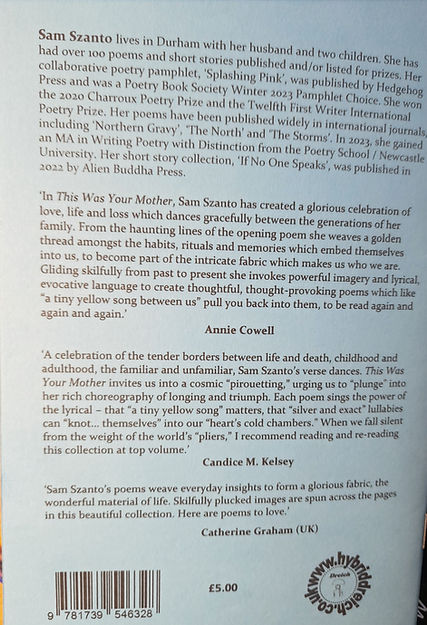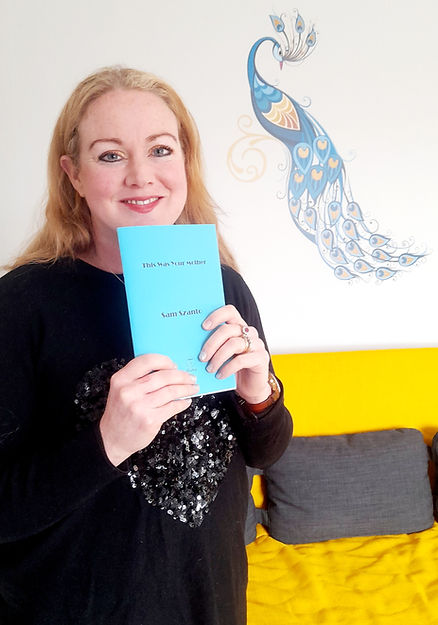20 Questions with... Margaret Royall
- samszanto2
- Dec 11, 2022
- 6 min read

Margaret’s work has featured widely in journals and anthologies, in print and online, most recently Impspired, Dreich, Black Bough Poetry and The Dawntreader. She has six books to her name, 2 poetry collections and 3 pamphlets plus a memoir in prose and verse. She won Hedgehog Press’ collection competitions in May 2020 and Where Flora Sings was subsequently nominated for the Laurel Prize. Her memoir The Road To Cleethorpes Pier was published by Crumps Barn Studio in May 2020. She has won or been s/listed in various competitions and featured as a guest on popular blogs. Her latest publication, Immersed in Blue, from Impspired Press, was released in January 2022.
A regular performer at open mic events, she leads a Nottinghamshire women’s poetry group and can be found on the following platforms:
Website: https://margaretroyall.com/
Twitter:@RoyallMargaret
Facebook: Writing from the Soul https://www.facebook.com/margaretbrowningroyall
Instagram: meggiepoet
Please introduce yourself. Where are you from? What was your life like growing up?
Hello, I’m Margaret Royall, originally from Cleethorpes in Lincolnshire, a seaside resort on the east coast. I had a wonderful though simple post-war childhood, very much influenced by the Methodist church, of which my parents were staunch members, and by school and music lessons: piano, singing, cello, playing in a local youth orchestra. This is well documented in my memoir of childhood The Road to Cleethorpes Pier, published by Crumps Barn Studio.

Did you always want to be a writer? If you also work, what do you do / did you do?
From an early age I composed poems and stories. I was born Margaret Browning and it was alleged we were connected to the great Robert Browning. Many family members wrote poetry too. My parents encouraged this, as did my teachers at primary school.
I’m retired now but have enjoyed many careers over the years, variously modern languages teacher ( German and French), college lecturer, reflexologist, regional sales manager for a skincare company, colour and image consultant, holistic stress manager and latterly I became self-employed and delivered foreign language tuition within Nottinghamshire businesses. Quite a varied career!
Tell us about your most recently published work in a sentence.
My most recent publication was Immersed in Blue, from Impspired, a collection of poetry and prose written on retreat over 10 consecutive visits on the Hebridean Isle of Iona.
What are you working on right now?
I have been making final edits to my next collection with Hedgehog Press entitled Toccata and Fugue. This incorporates reflections on childhood’s legacy (Toccata) and more recent times, looking back from my third age ( Fugue). Each poem in Fugue is linked to an artist’s colour and a piece of music. I’m also getting together a pamphlet of imagistic poems, a genre that appeals to me and which I’m keen to pursue.
Do you have a writing routine, and if so what is it?
Being retired I have the luxury of writing every day. I usually write in the morning, if free, but if immersed in a project I can write all day, occasionally forgetting to eat!
Where do you write – always in the same space, or different places? Can you write ‘on the move’?
Generally I sit on my comfy sofa in the living room and write straight into word on my iPad, but I do sometimes write when out and about and on holiday. I’ve sometimes scribbled notes on receipts and tickets in my pocket if no paper is to hand. A recent workshop has inspired me to write outdoors more, change location.
What advice do you have for other authors who are starting out? What is the best advice you’ve heard?
Believe in yourself. If you don’t no one else will! Read widely, attend workshops run by poets you admire, attend writing conferences, go on retreats, join a local writers’ group, join writers’ events and open mic sessions on zoom. If you are short of funds apply for grants from the Arts Council or local sources.
Best advice I’ve received: write, write write, don’t aim for perfection first time, then edit, edit, edit. Ask for feedback from writers you admire and trust. Apply for mentoring from an accredited poet. Submit your work regularly, enter competitions, grow a thick skin and learn to accept rejection and criticism. Keep at it!
Do you enjoy doing live readings or are they a necessary evil – or somewhere in between?
Yes, I enjoy doing live readings, though I get very nervous beforehand. Most of my books were published during lockdown, when live events weren’t happening, so a lot of opportunities for this were lost. But I do love taking part in open mic sessions on zoom to promote myself and my books.
Are there recurring themes in your work? Where do you feel these emanate from if so?
So far my main themes have been nature, landscape and memory. I grew up on the coast and spent a lot of time on the beach as a child. We lived close to the beautiful Lincolnshire wolds too and my Dad used to drive us out for picnics there on Sunday afternoons. Many of my holidays have been on islands, e.g.painting on Crete.
Should writers have a moral purpose? What is the purpose of a writer in today’s society?
A difficult question. I don’t seek to moralise but I do sometimes comment in my work on things that I feel are obviously wrong in our society. I tend to shy away from commenting on hot political topics, for instance. Traditionally it’s been the poet’s role to inform and reform society’s thinking but I lack confidence to do this effectively so tend to shy away from controversial topics.
Do you write between genres or not?
In my poetry I use many different forms and love to try my hand at new ones. My favourites are villanelle, triolet, sonnet, sestina and acrostic. Mostly I employ free verse and the occasional prose poem (though I’ve found it hard to define the boundaries of these).
I’ve written less prose but have had a few short stories published, which all fall into the same category of literary fiction. I’d love to actually finish writing a novel one day, maybe a crime thriller?
Which living writers do you most admire?
There are too many to name, but here are a few: poets George Szirtes, Matthew MC Smith, Damien B Donnelly, Anna Saunders, John McCullough, Nigel Kent, Phil Vernon, Ankh Spice, Matt Duggan, Kerry Darbishire, Kim Moore, Helen Mort, Jo Bell, Jenny Mitchell, Alison Lock, Hannah Lowe, Rae Howells……… plus a host of American women writers, Kim Addonizio, Louise Glück, Maya Angelou…. I could go on and on
Which dead writers do you most admire?
Difficult choice!. A few are William Wordsworth, John Drinkwater, Seamus Heaney, Ted Hughes, Sylvia Plath, Robert Frost, Edward Thomas, Dylan Thomas, Lawrence Ferlinghetti, Ruth Stone, Rupert Brooke, Wilfred Own, Robert Browning, Elizabeth Barrett-Browning, Tennyson, Shelley, Yeats…the usual ones students of poetry read.
What’s the book you wish you’d written?
A Thousand Splendid Suns (Khaled Hosseini) or A Theatre for Dreamers ( Polly Sansom) or To Kill a Mockingbird (Harper Lee)
What other external influences do you have: nature/place, music etc?
Music, definitely, mostly classical though some jazz and pop. Baroque music in particular, Bach, Vivaldi etc and for jazz, saxophonist Jan Gabarek ( Officium), choral work of Morten Lauridsen and the great Thomas Tallis (wow!) John Ritter’s carols…… and much more.
Beautiful gardens in National Trust places and stately homes, art exhibitions ( pre-Raphaelites, Constable, Lowry, Impressionists.)
Do you suffer from ‘writer’s block’ and how do you overcome it if so?
Not usually. There are so many stimuli around us, TV, radio, overheard conversations, prompts online, artworks, podcasts etc? You just need to look around you and inspiration will come.
What’s been your favourite reaction to your writing?
Great book reviews, emails from readers telling me how my book has inspired them in some small way, or a poet I admire requesting to interview me or reading my work on a podcast. Praise from fellow poets received on @TopTweetTuesday or at an online reading.
How do your family and friends feel about your writing?
Family are very supportive. I’m especially lucky that my elder son, Simon, studied poetry with George Szirtes and has had poems published in prestigious journals. We sometimes collaborate on a poetry conversation. He and I speak the same language and it’s a joy to discuss with him. I respect his opinion.
Some friends are supportive and some disappointingly are not interested at all and don’t want to hear about my books. You can’t win them all.
Do you have a favourite bookshop?
Yes, I do. Lindum Books on Bailgate by the cathedral in Lincoln is wonderful. They stock some of my books and have featured me in an online Meet the Author evening. Their bookshop is independent and a joy to browse there.
How do you see the future of writing? Will we become more or less dependent on Amazon?
Writing will always be an important part of life and culture. In times of deep trouble and despair, such as we face now, the voice of the poet in particular has never played a more crucial part. Long may that continue.
I hope we won’t become over-dependent on Amazon. I think physical books you can touch and smell will always be popular. I try to buy from the website bookshop.org as an alternative to Amazon. You can name the bookshop you want to support there. Sadly Amazon offers are frequently much cheaper and if price matters to buyers they will order there. Ebooks are useful for travel, of course, but to me there is nothing like an actual hard copy. I have too many books in my bijou cottage, but they are my friends and I couldn’t bear to part with them.










Comments